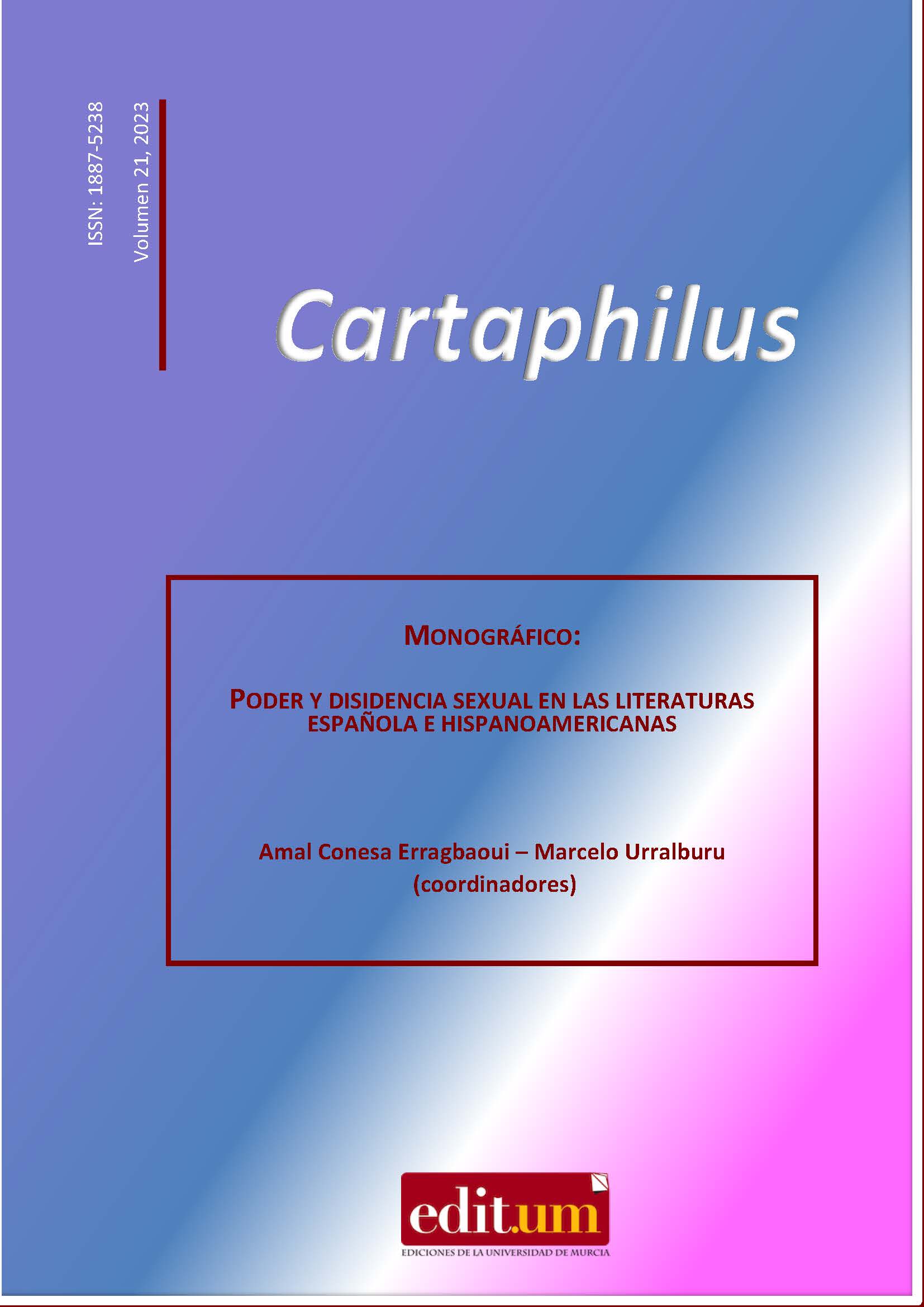Valeria Luiselli's poetics in 'Los niños perdidos'
Abstract
This paper analyzes the poetic of Valeria Luiselli’s Los niños perdidos. The text, which is subtitled «Un ensayo en treinta preguntas», is actually a hybrid form made of essay and fiction. Three elements are key to its structure: the voice of the narrator, a series of questions from an immigration questionnaire, and the different answers that the «niños perdidos» offer to it. In addition, due to its hybrid layout, the mobile development of its writng and its presentation of the political refugee crisis as an intersection of statements, Los niños perdidos can be understood as a reflection of the Postmodern thought that that signals the delegitimization of metanarratives.
Downloads
-
Abstract553
-
.pdf (Español (España))280
References
Agamben, Giorgio (2007): Infancia e Historia: Destrucción de la experiencia y Origen de la Historia. Buenos Aires: Adriana Hidalgo (traducción de S. Mattoni).
Benjamin, Walter (1982a): «El pensamiento destructivo». En Discursos interrum-pidos I (pp. 159-161). Traducción de Jesús Aguirre. Madrid: Taurus.
Benjamin, Walter (1982b): «Tesis de la filosofía de la historia». En Discursos in-terrumpidos I (pp. 175-193). Madrid: Taurus (traducción de J. Aguirre).
Benveniste, Émile (1974): «De la subjetividad en el lenguaje». Problemas de lin-güística general (pp. 179-187). México: Siglo XXI.
Espacio Fundación Telefónica Madrid (2019): «Encuentro con Valeria Luiselli y Enrique Vila-Matas», https://www.youtube.com/watch?v=urn4FdHxawc en Youtube (consultado el 30 de diciembre de 2022).
Garí Barceló, Bernat (2021a): «La escritura en movimiento de Valeria Luiselli: Del paseo solitario a la venida del otro». Mitologías Hoy, 3, 103-117.
Garí Barceló, Bernat (2021b): «La crisis de los refugiados en Desierto sonoro y Los niños perdidos de Valeria Luiselli». En S.A. Flores Borjabad y R. Pérez Cabaña (Eds.), Nuevos retos y perspectivas de la investigación en literatu-ra, lingüística y traducción (pp. 350-364). Madrid: Dykinson.
Eco, Umberto (1992): Obra abierta. Barcelona: Planeta.
Ferraris, Maurizio (2013): Manifiesto del nuevo realismo. Madrid: Biblioteca Nueva.
Logie, Ilse (2020): «Los niños perdidos de Valeria Luiselli: el intérprete ante las vidas ‘dignas de duelo’». En Iberoamericana. America Latina, España, Portugal: ensayos sobre letras, historia y sociedad, vol. 20, no 75, 103-116.
Luiselli, Valeria (2019a): Los niños perdidos (un ensayo en cuarenta preguntas). Madrid: Sexto Piso.
Luiselli, Valeria (2019b): Desierto sonoro. Madrid: Sexto Piso.
Luiselli, Valeria (2020): Papeles falsos. Madrid: Sexto Piso.
Lyotard, Jean-François (2014): La condición postmoderna: Informe sobre el sa-ber. Madrid: Cátedra.
Martínez, Antonio (16 de diciembre, 2016): «Valeria Luiselli habla sobre su libro 'Los niños perdidos' y la importancia de la resistencia en la era de Trump». The New York Times. Consultado de https://www.nytimes.com/ es/2016/12/16/espanol/cultura/valeria-luiselli-ninos-perdidos.html (28 de diciembre de 2022).
Morales Muñoz, Brenda (2019): «Reflexiones sobre la migración a partir de Los niños perdidos de Valeria Luiselli». En Diseminaciones, vol. 2, no 3 (enero-junio 2019), 53-70.
Real Academia Española: Diccionario de la lengua española. 23.a ed. [versión 23.4 en línea]. (2 de enero de 2022).
Seoane, Andrés (2019): Valeria Luiselli: «Sólo un exiliado puede contar realmen-te su historia». En El Cultural. Consultado de https://elcultural.com/valeria-luiselli-solo-un-exiliado-puede-contar-realmente- su-historia (30 de diciembre de 2022)
Trachana, Angelique (1998): «Aporías de la Posmodernidad: Un problema espa-cial y cognitivo». Astrágalo: Cultura De La Arquitectura Y La Ciudad, 10, 51-68.
Copyright (c) 2024 María Isabel Cuena Caro-Patón

This work is licensed under a Creative Commons Attribution-NonCommercial-NoDerivatives 4.0 International License.
Works published in this journal are subject to the following terms:
1. The Servicio de Publicaciones of the University of Murcia (the publisher) reserves the copyright of the published works and encourages and allows their reuse under the usage licence indicated in point
© Servicio de Publicaciones, Universidad de Murcia, 2015
2. Works are published in the electronic edition of the journal under a Creative Commons Reconocimiento-NoComercial-SinObraDerivada 4.0 International licence (legal text). They may be copied, used, disseminated, transmitted and publicly displayed, on condition that: i) the author and original source of the publication are cited (journal, publisher and URL of the work); ii) the material is not used for commercial purposes; iii) the existence and specifications of this licence for use are mentioned.

3. Self-archiving conditions We allow and encourage authors to electronically disseminate the preprint versions (the pre-review version) and/or post print (the version that has been reviewed and accepted for publication) of their works before they are published as this encourages earlier circulation and dissemination and so a potential increase in their citation and impact in the academic community.




